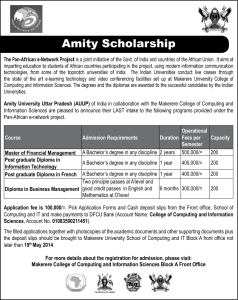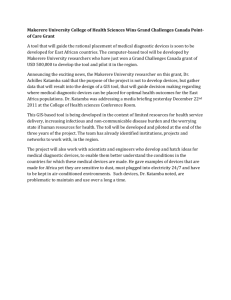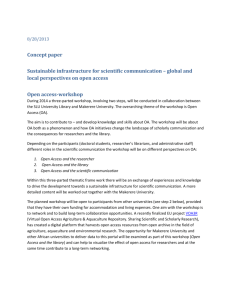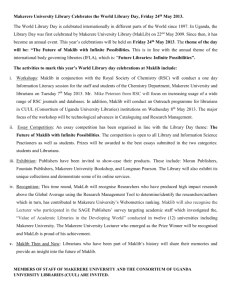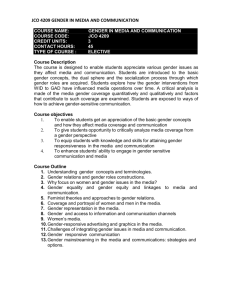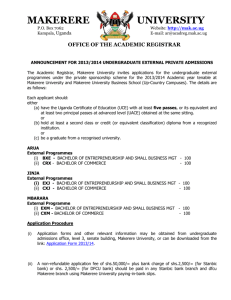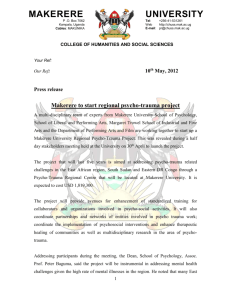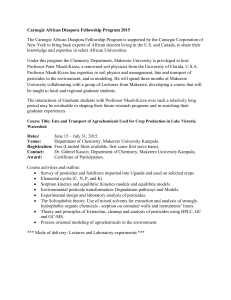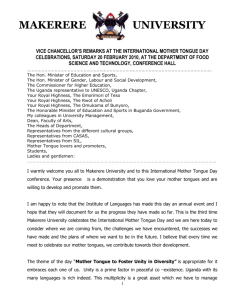citation for professor endre lillethun
advertisement
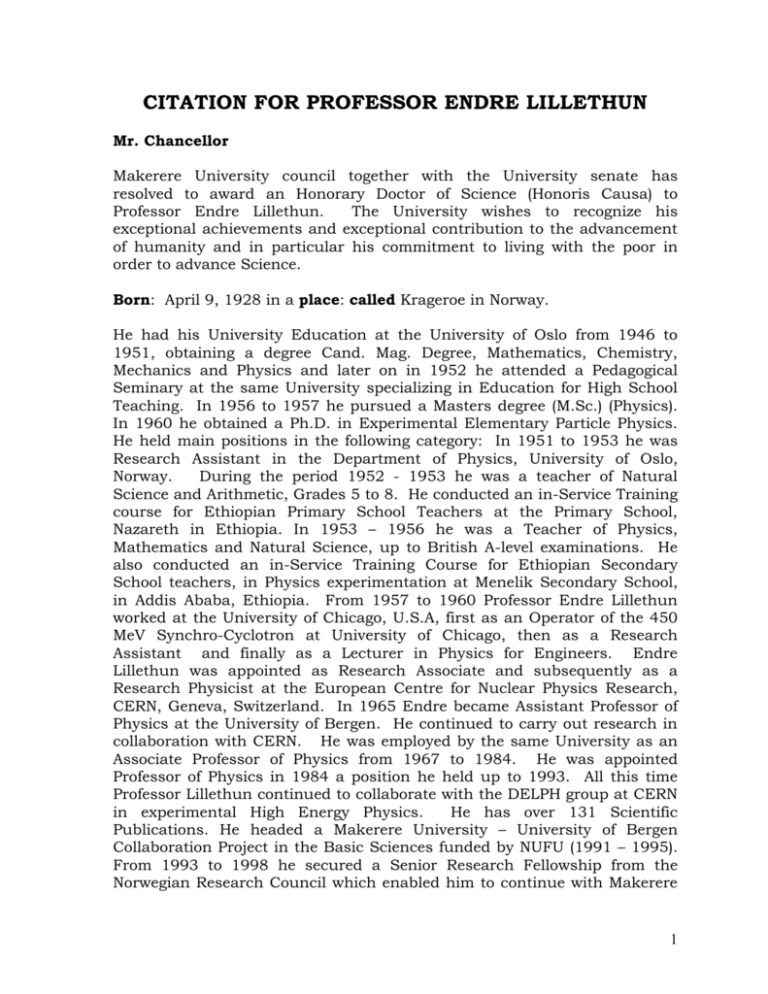
CITATION FOR PROFESSOR ENDRE LILLETHUN Mr. Chancellor Makerere University council together with the University senate has resolved to award an Honorary Doctor of Science (Honoris Causa) to Professor Endre Lillethun. The University wishes to recognize his exceptional achievements and exceptional contribution to the advancement of humanity and in particular his commitment to living with the poor in order to advance Science. Born: April 9, 1928 in a place: called Krageroe in Norway. He had his University Education at the University of Oslo from 1946 to 1951, obtaining a degree Cand. Mag. Degree, Mathematics, Chemistry, Mechanics and Physics and later on in 1952 he attended a Pedagogical Seminary at the same University specializing in Education for High School Teaching. In 1956 to 1957 he pursued a Masters degree (M.Sc.) (Physics). In 1960 he obtained a Ph.D. in Experimental Elementary Particle Physics. He held main positions in the following category: In 1951 to 1953 he was Research Assistant in the Department of Physics, University of Oslo, Norway. During the period 1952 - 1953 he was a teacher of Natural Science and Arithmetic, Grades 5 to 8. He conducted an in-Service Training course for Ethiopian Primary School Teachers at the Primary School, Nazareth in Ethiopia. In 1953 – 1956 he was a Teacher of Physics, Mathematics and Natural Science, up to British A-level examinations. He also conducted an in-Service Training Course for Ethiopian Secondary School teachers, in Physics experimentation at Menelik Secondary School, in Addis Ababa, Ethiopia. From 1957 to 1960 Professor Endre Lillethun worked at the University of Chicago, U.S.A, first as an Operator of the 450 MeV Synchro-Cyclotron at University of Chicago, then as a Research Assistant and finally as a Lecturer in Physics for Engineers. Endre Lillethun was appointed as Research Associate and subsequently as a Research Physicist at the European Centre for Nuclear Physics Research, CERN, Geneva, Switzerland. In 1965 Endre became Assistant Professor of Physics at the University of Bergen. He continued to carry out research in collaboration with CERN. He was employed by the same University as an Associate Professor of Physics from 1967 to 1984. He was appointed Professor of Physics in 1984 a position he held up to 1993. All this time Professor Lillethun continued to collaborate with the DELPH group at CERN in experimental High Energy Physics. He has over 131 Scientific Publications. He headed a Makerere University – University of Bergen Collaboration Project in the Basic Sciences funded by NUFU (1991 – 1995). From 1993 to 1998 he secured a Senior Research Fellowship from the Norwegian Research Council which enabled him to continue with Makerere 1 University – University of Bergen Collaboration in the Basic Sciences Project. Prof. Endre Lillethun’s participation in the advancement of Basic Sciences at Makerere University In 1988, Professor Endre Lillethun, who was then Associate Director at the International Centre for Theoretical Physics, (Trieste, Italy) visited the Department of Physics, Makerere University to obtain first hand information about the teaching and research facilities in the department. Professor Lillthun was deeply touched by the sorry state that prevailed in the department. The laboratories were relying on instruments which broke down every now and then during the course of undergraduate practical sessions. This prompted Professor Lillethun to look for funding from international scientific bodies like the World Laboratory. These efforts did not yield any positive results. During 1990/91 the Norwegian Committee for collaboration with developing countries in University Education (NUFU) was established Professor Lillethun had, since his first visit to Makerere, been convinced of the need to extend rehabilitation efforts beyond the Department of Physics to the Departments of Chemistry and Mathematics. In 1990/91, under the stewardship of Professor Lillethun, the Departments of Physics, Chemistry and Mathematics submitted an application to NUFU for funding of the rehabilitation. NUFU initially rejected the application on the grounds that the project was of such large magnitude that it would not be possible to run successfully. Professor Lellethun persevered and kept on canvassing support for the application, emphasizing the fact that the three subjects were of basic importance for technological development of Uganda. The application “Basic Sciences for Technological Development in Uganda” was subsequently approved (Pro39/91). The University of Bergen was to be the collaborating University, in Norway. In 1992 the Department of Science and Technical Education, Makerere University, was included in the project. In the Department of Physics, the project was initially engaged in the revision and modernization of the physics curriculum, and rehabilitation of undergraduate laboratories. Special emphasis was placed on instrumentation for the Electronics laboratory since this was pivotal in technological development. It was imperative to train technical staff through workshops conducted at Makerere by technical staff from Bergen and through apprenticeship with companies in Norway. Professor Lillethun was concerned that there was hardly any research being carried out in the Department of Physics. After the first year of the project, in collaboration with the University of Bergen, collaborative research activities were identified. This was followed by acquisition of equipment for 2 experimental research. This began a programme of capacity building through training of academic staff who had only MSc’s to train to PhD level under joint supervision by staff at Makerere and the University of Bergen. These activities extended to the Departments of Chemistry and Mathematics. As a result of Professor Lillethun’s initiative, the Departments of Physics, Chemistry, Mathematics and DOSATE were funded for 15 years (1992 – 2006) in three phases of five years each. By the end of the NUFU support in 2006, the Department of Physics had trained 14 MSc’s and 6 PhD’s, the Department of Chemistry produced 30 MSc’s and 5 PhD’s; the Department of Mathematics trained 7 MSc’s and 8 PhD’s, where as DOSATE had 3 PhD’s who still had to complete. The increased research activities yielded 51 publications in refereed journals and 106 papers presented at workshops. In summary, the following were achieved by the Basic Sciences project: Provision of teaching and learning materials. Rehabilitation of the laboratories in Physics, Chemistry and DOSATE. Improvement of infrastructure. Capacity building through training of MSc’s to PhD level. Competence building through increased research activities. International research collaboration. The Basic Sciences project acted spring board for other NUFU projects not only in the Faculty of Science but the entire University, especially the Faculties of Medicine and Technology. It also led to strong collaboration with the University of Bergen in fields like Library services, Human Resource and Financial Information Systems and ICT. More importantly, it resulted into the signing of the Makerere University – University of Bergen frame agreement of cooperation that has just been renewed for the next ten years. In conclusion, because of his contribution to human development and advancement of Basic Science at Makerere University, we would like to honor Professor Endre Lillethun. Mr. Chancellor Sir, I have the pleasure and honor of presenting to you, Professor Endre Lillethun for the award of Honorary Degree of Doctor of Science (Honoris Causa) of Makerere University, in absentia. 0o0o0o0o0o00o0o0o0 3
